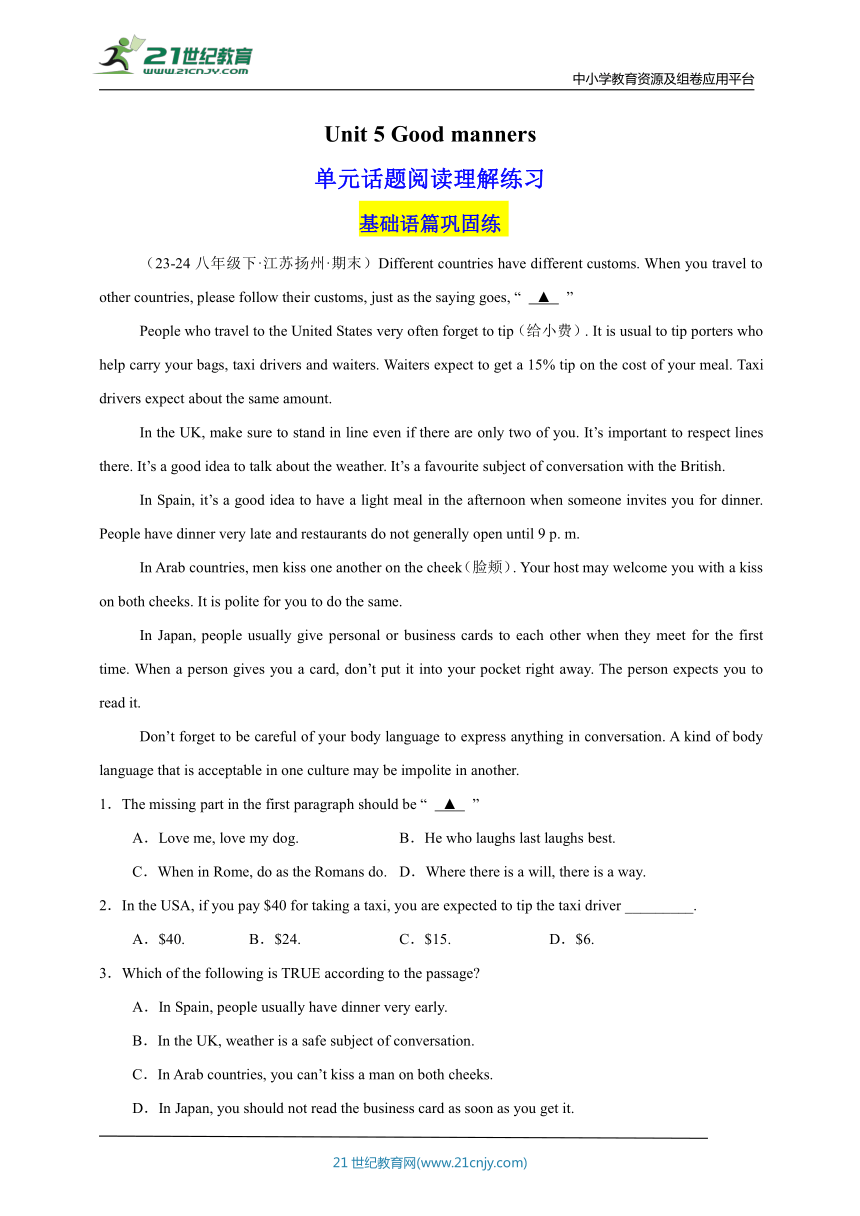
中小学教育资源及组卷应用平台 Unit 5 Good manners 单元话题阅读理解练习 基础语篇巩固练 (23-24八年级下·江苏扬州·期末)Different countries have different customs. When you travel to other countries, please follow their customs, just as the saying goes, “ ▲ ” People who travel to the United States very often forget to tip(给小费). It is usual to tip porters who help carry your bags, taxi drivers and waiters. Waiters expect to get a 15% tip on the cost of your meal. Taxi drivers expect about the same amount. In the UK, make sure to stand in line even if there are only two of you. It’s important to respect lines there. It’s a good idea to talk about the weather. It’s a favourite subject of conversation with the British. In Spain, it’s a good idea to have a light meal in the afternoon when someone invites you for dinner. People have dinner very late and restaurants do not generally open until 9 p. m. In Arab countries, men kiss one another on the cheek(脸颊). Your host may welcome you with a kiss on both cheeks. It is polite for you to do the same. In Japan, people usually give personal or business cards to each other when they meet for the first time. When a person gives you a card, don’t put it into your pocket right away. The person expects you to read it. Don’t forget to be careful of your body language to express anything in conversation. A kind of body language that is acceptable in one culture may be impolite in another. 1.The missing part in the first paragraph should be “ ▲ ” A.Love me, love my dog. B.He who laughs last laughs best. C.When in Rome, do as the Romans do. D.Where there is a will, there is a way. 2.In the USA, if you pay $40 for taking a taxi, you are expected to tip the taxi driver _____. A.$40. B.$24. C.$15. D.$6. 3.Which of the following is TRUE according to the passage A.In Spain, people usually have dinner very early. B.In the UK, weather is a safe subject of conversation. C.In Arab countries, you can’t kiss a man on both cheeks. D.In Japan, you should not read the business card as soon as you get it. (23-24八年级下·江苏徐州·期中)I have a rule for travel—never carry a map. I prefer to ask for direction. Foreign visitors are often puzzled (困惑的) in Japan because most streets there don’t have names. In Japan, people use landmarks instead of street names. For example, the Japanese will say to travelers, “Go straight down to the corner. Turn left at the big hotel and go past a fruit market. The post office is across from the bus stop.” In the country of the American Midwest, usually there are not many landmarks. There are no mountains, so the land is very flat. In many places there are no towns or buildings within miles. Instead of landmarks, people will tell you directions and distances. In Kansas, for example, people will say, “Go north two miles. Turn east, and then go another mile.” People in Los Angeles, California, have no idea of distance on the map. They measure(测量) distance ... ...
~~ 您好,已阅读到文档的结尾了 ~~

